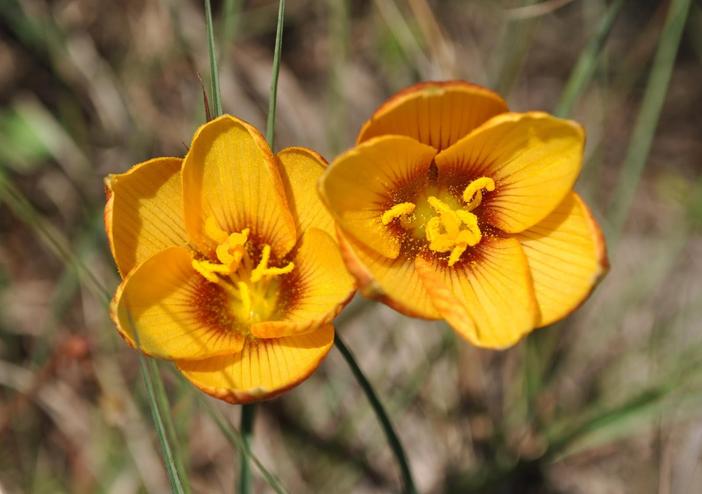Rio Grande Copperlily
(Habranthus tubispathus)
Rio Grande Copperlily (Habranthus tubispathus)
/
/

Andrés González
CC BY-SA 3.0
Image By:
Andrés González
Recorded By:
Copyright:
CC BY-SA 3.0
Copyright Notice:
Photo by: Andrés González | License Type: CC BY-SA 3.0 | License URL: https://creativecommons.org/licenses/by-sa/3.0 | Uploader: Edithsme | Publisher: Wikipedia Commons





































Estimated Native Range
Summary
Habranthus tubispathus, commonly known as Rio Grande Copperlily, is a perennial bulb that belongs to the Amaryllidaceae family. It is native to south America. This species is particularly adapted to areas that experience seasonal rainfall, often blooming after heavy rains. The Rio Grande Copperlily reaches a modest height of 10 to 20 centimeters (4 to 8 inches) when in flower. Its distinctive blooms are usually yellow with copper tones on the outside, and the tepals are about 3 centimeters (1.2 inches) long, fused at the base to form a tube. The flowers are uniquely angled upright on the stem. Foliage appears after flowering and consists of narrowly linear leaves. The plant is somewhat frost-tolerant, surviving temperatures down to 0 °C (32 °F) if situated in a protected and sunny location.
The Rio Grande Copperlily is appreciated for its sporadic and charming late summer to autumn blooms, which can add unexpected color to gardens. It is often used in rock gardens, borders, and as a naturalizing bulb in informal areas. It requires full sun exposure and well-drained soils to thrive. While it can tolerate medium amounts of water, overwatering or poor drainage can be detrimental. This species is known to seed freely, which can be advantageous for naturalistic plantings but may require management to prevent unwanted spread.CC BY-SA 4.0
The Rio Grande Copperlily is appreciated for its sporadic and charming late summer to autumn blooms, which can add unexpected color to gardens. It is often used in rock gardens, borders, and as a naturalizing bulb in informal areas. It requires full sun exposure and well-drained soils to thrive. While it can tolerate medium amounts of water, overwatering or poor drainage can be detrimental. This species is known to seed freely, which can be advantageous for naturalistic plantings but may require management to prevent unwanted spread.CC BY-SA 4.0
Plant Description
- Plant Type: Herb
- Height: 0.5-1 feet
- Width: 0.5-1 feet
- Growth Rate: Moderate
- Flower Color: Yellow, Orange
- Flowering Season: Summer, Fall
- Leaf Retention: Deciduous
Growth Requirements
- Sun: Full Sun
- Water: Medium
- Drainage: Fast
Common Uses
Low Maintenance, Rock Garden, Showy Flowers
Other Names
Common Names: Barbados Snowdrop, Copper-Lily
Scientific Names: , Habranthus tubispathus, Habranthus andersonii, Habranthus texanus, Zephyranthes texana, Zephyranthes commersoniana, Zephyranthes andersonii, Hippeastrum tubispathum, Amaryllis tubispatha, Hippeastrum andersonii
GBIF Accepted Name: Habranthus tubispathus (L’Hér.) Traub